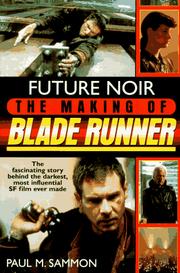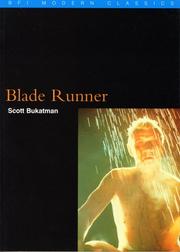| Listing 1 - 8 of 8 |
Sort by
|
Book
ISBN: 9780415485852 0415485843 9780415485845 0415485851 Year: 2015 Publisher: London ; New York, NY : Routledge,
Abstract | Keywords | Export | Availability | Bookmark
 Loading...
Loading...Choose an application
- Reference Manager
- EndNote
- RefWorks (Direct export to RefWorks)
Ridley Scott's Blade Runner is widely regarded as a "masterpiece of modern cinema" and is regularly ranked as one of the great films of all time. Set in a dystopian future where the line between human beings and 'replicants' is blurred, the film raises a host of philosophical questions from what it is to be human and to the nature of consciousness. This is the first book to explore and address these questions and more from a philosophical point of view. Beginning with a helpful introduction, specially commissioned chapters examine the following questions: - What is the relationship between emotion and reason and how successful is Blade Runner in depicting emotions? - Can we know what it is like to be a replicant? - What is the origin of personhood and what qualifies one as a person? - Does the style of Blade Runner have any philosophical significance? - To what extent is Blade Runner a meditation on the nature of film itself? Including a biography of the director and annotated further reading at the end of each chapter, Blade Runner is essential reading for students interested in philosophy and film studies.

ISBN: 0061053147 9780061053146 Year: 1996 Publisher: New York HarperPrism
Abstract | Keywords | Export | Availability | Bookmark
 Loading...
Loading...Choose an application
- Reference Manager
- EndNote
- RefWorks (Direct export to RefWorks)
The 1992 release of the "Director's Cut" only confirmed what the international film cognoscenti had known all along: Ridley Scott's Blade Runner, based on Philip K. Dick's brilliant and troubling SF novel Do Androids Dream of Electric Sheep, still rules as the most visually dense, thematically challenging, and influential SF film ever made. Future Noir is the story of that triumph. The making of Blade Runner was a seven-year odyssey that would test the stamina and the imagination of writers, producers, special effects wizards, and the most innovative art directors and set designers in the industry. A fascinating look at the ever-shifting interface between commerce and the art that is modern Hollywood, Future Noir is the intense, intimate, anything-but-glamorous inside account of how the work of SF's most uncompromising author was transformed into a critical sensation, a commercial success, and a cult classic.--Publisher description.
Book
ISBN: 9781844575220 1844575225 Year: 2016 Publisher: London New York Palgrave Macmillan on behalf of the British Film Institute
Abstract | Keywords | Export | Availability | Bookmark
 Loading...
Loading...Choose an application
- Reference Manager
- EndNote
- RefWorks (Direct export to RefWorks)
"Ridley Scott's dystopian classic Blade Runner, an adaptation of Philip K. Dick's novel, Do Androids Dream of Electric Sheep?, combines noir with science fiction to create a groundbreaking cyberpunk vision of urban life in the twenty-first century. With replicants on the run, the rain-drenched Los Angeles which Blade Runner imagines is a city of oppression and enclosure, but a city in which transgression and disorder can always erupt. Graced by stunning sets, lighting, effects, costumes and photography, Blade Runner succeeds brilliantly in depicting a world at once uncannily familiar and startlingly new. In his innovative and nuanced reading, Scott Bukatman details the making of Blade Runner and its steadily improving fortunes following its release in 1982. He situates the film in terms of debates about postmodernism, which have informed much of the criticism devoted to it, but argues that its tensions derive also from the quintessentially twentieth-century, modernist experience of the city -- as a space both imprisoning and liberating ..."--Publisher description.
Blade runner (Motion picture) --- Bladerunner (Motion picture) --- #SBIB:309H1320 --- #SBIB:309H1321 --- De filmische boodschap: algemene werken (met inbegrip van algemeen filmhistorische werken en filmhistorische werken per land) --- Films met een amusementsfunctie en/of esthetische functie: algemeen --- Blade runner (Motion picture).

ISBN: 0851706231 Year: 1997 Publisher: London British Film Institute
Abstract | Keywords | Export | Availability | Bookmark
 Loading...
Loading...Choose an application
- Reference Manager
- EndNote
- RefWorks (Direct export to RefWorks)
Scott, Ridley --- Scott Bukatman --- filmgeschiedenis --- Scott Ridley --- 791.471 SCOTT --- film --- Blade runner (Motion picture) --- Bladerunner (Motion picture) --- Film
Book
ISBN: 9781501311802 9781501311796 1501311808 1501311794 Year: 2017 Publisher: New York : Bloomsbury Academic,
Abstract | Keywords | Export | Availability | Bookmark
 Loading...
Loading...Choose an application
- Reference Manager
- EndNote
- RefWorks (Direct export to RefWorks)
Postmodernism. --- Blade runner (Motion picture) --- Post-modernism --- Postmodernism (Philosophy) --- Arts, Modern --- Avant-garde (Aesthetics) --- Modernism (Art) --- Philosophy, Modern --- Post-postmodernism --- Bladerunner (Motion picture) --- #SBIB:309h52 --- #SBIB:309H520 --- Audiovisuele communicatie: algemene werken --- Postmodernism
Book
ISBN: 9783936681543 3936681546 Year: 2013 Publisher: Stuttgart : Edition Axel Menges,
Abstract | Keywords | Export | Availability | Bookmark
 Loading...
Loading...Choose an application
- Reference Manager
- EndNote
- RefWorks (Direct export to RefWorks)
Motion pictures --- Films --- Cinéma --- History. --- Comptes rendus --- Histoire --- Hitchcock, Alfred, --- Edwards, Blake, --- Scott, Ridley --- Ruzowitzky, Stefan --- Criticism and interpretation. --- Birds (Motion picture) --- Party (Motion picture : 1968) --- Blade runner (Motion picture) --- Anatomie (Motion picture) --- Gladiator (Motion picture : 2000)
Book
ISBN: 3030567540 3030567532 Year: 2021 Publisher: Cham, Switzerland : Palgrave Macmillan,
Abstract | Keywords | Export | Availability | Bookmark
 Loading...
Loading...Choose an application
- Reference Manager
- EndNote
- RefWorks (Direct export to RefWorks)
This book provides a collection of Lacanian responses to Denis Villeneuve’s Blade Runner 2049 from leading theorists in the field. Like Ridley Scott’s original Blade Runner film, its sequel is now poised to provoke philosophical and psychoanalytic arguments, and to provide illustrations and inspiration for questions of being and the self, for belief and knowledge, the human and the post-human, amongst others. This volume forms the vanguard of responses from a Lacanian perspective, satisfying the hunger to extend the theoretical considerations of the first film in the various new directions the second film invites. Here, the contributors revisit the implications of the human-replicant relationship but move beyond this to consider issues of ideology, politics, and spectatorship. This exciting collection will appeal to an educated film going public, in addition to students and scholars of Lacanian psychoanalysis, psychoanalytic theory, cultural studies, film theory, philosophy and applied psychoanalysis. Calum Neill is Associate Professor of Psychoanalysis & Cultural Theory at Edinburgh Napier University, Scotland, and Director of Lacan in Scotland. He has written a number of monographs, including Without Ground: Lacanian Ethics and the Assumption of Subjectivity (2011) and Jacques Lacan: The Basics (2017). He is the co-editor of both the Palgrave Lacan Series the three volume guide Reading Lacan’s Ecrits (2018-2021).
Psychology. --- Motion pictures. --- Psychoanalysis. --- Culture—Study and teaching. --- Philosophy. --- Psychology, general. --- Film Theory. --- Cultural Theory. --- Philosophy of Technology. --- Mental philosophy --- Humanities --- Psychology --- Psychology, Pathological --- Cinema --- Feature films --- Films --- Movies --- Moving-pictures --- Audio-visual materials --- Mass media --- Performing arts --- Behavioral sciences --- Mind --- Science, Mental --- Human biology --- Philosophy --- Soul --- Mental health --- History and criticism --- Philosophy in motion pictures. --- Lacan, Jacques, --- Blade runner 2049 (Motion picture) --- Motion pictures --- Lacan, Jacques --- Bladerunner 2049 (Motion picture) --- Blade runner (Motion picture) --- Technology—Philosophy. --- Behavioral Sciences and Psychology.
Book
ISBN: 9781440801877 Year: 2014 Publisher: Santa Barbara Oxford [etc.] Praeger
Abstract | Keywords | Export | Availability | Bookmark
 Loading...
Loading...Choose an application
- Reference Manager
- EndNote
- RefWorks (Direct export to RefWorks)
Jaws (Motion picture) --- Star Wars (Motion picture) --- Superman (Motion picture) --- Star Trek films --- Tron (Motion picture) --- Parting Glances (Motion picture) --- She's Gotta Have It (Motion picture) --- The Thin Blue Line (Motion picture) --- Sex, lies, and videotape (Motion picture) --- Blade Runner (Motion picture) --- Pulp Fiction (Motion picture) --- Showgirls (Motion picture) --- Toy Story (Motion picture) --- Psycho (Motion picture) --- The Matrix (Motion picture) --- The Blair Witch Project (Motion picture) --- Crouching Tiger, Hidden Dragon (Motion picture) --- The Lord of the Rings (Motion picture trilogy)
| Listing 1 - 8 of 8 |
Sort by
|

 Search
Search Feedback
Feedback About UniCat
About UniCat  Help
Help News
News